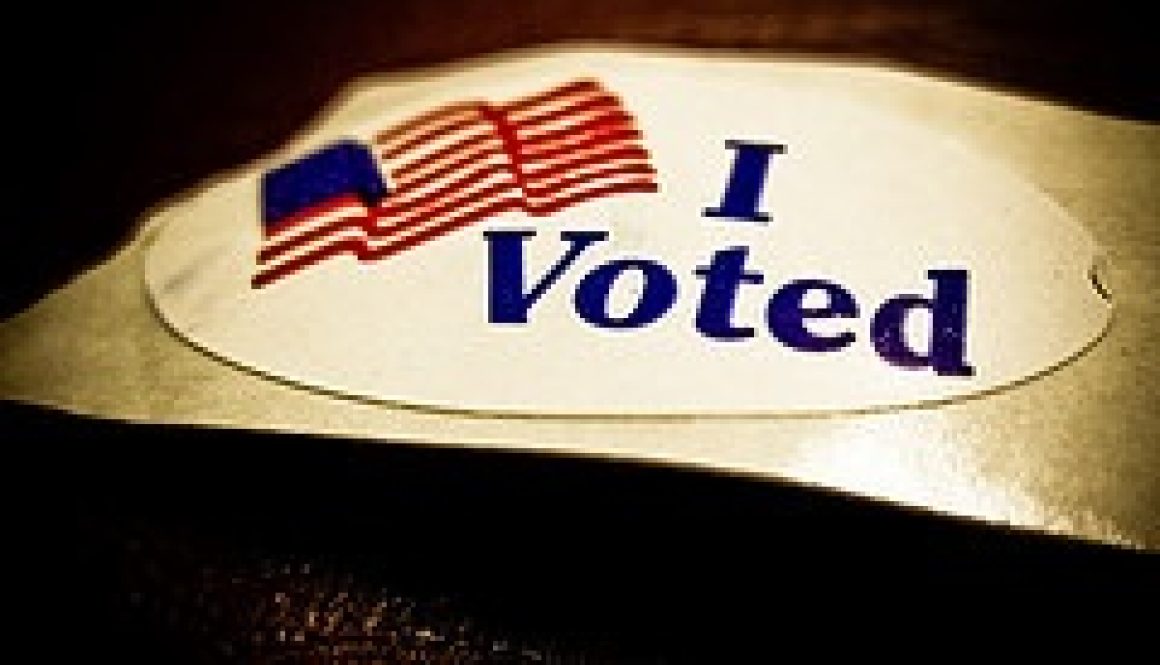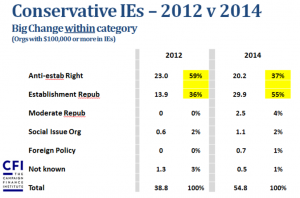U.S. Chamber’s New Primary Focus Puts Incumbents in Crosshairs
By: Aurora Randolph, Congress Watch legal fellow
Massive troves of United States Chamber of Commerce (U.S. Chamber) money in elections are hardly a new occurrence. The Chamber spent $70 million helping elect Republicans in 2014. But as rogue right-wing Republicans continue to yank on the leash of their establishment conservative leadership, reality seems to be setting in for the Chamber – not just any Republican in office will do. To that end, the Chamber is looking to aggressively shape the Republican narrative by pouring money and resources into elections even earlier, during the primaries. And no punches will be pulled for GOP incumbents.
A look at the changing trend in money from independent expenditures in primaries
Chamber’s Recent Success
Early primary money has been a winning strategy for the Chamber. In 2014, the candidate backed by the U.S. Chamber of Commerce won in 14 out of the 15 races.
In 2013, the U.S. Chamber helped nudge a Republican primary in the establishment’s favor when it contributed around $200,000 to Representative Bradley Byrne’s campaign for the open seat of Jo Bonner in Alabama’s 1st District. Byrne ran against tea-partier Republican Dean Young, a disciple of the Freedom Caucus who had said he wouldn’t support John Boehner as speaker. The race was razor-thin for the duration but the Chamber’s cash (and hail-Mary ad featuring Brett Favre) proved vital in Byrne’s finish.
In the expensive, dramatic Mississippi senate race Chamber-supported Thad Cochran defeated tea-party darling Chris McDaniel in the primary runoff. McDaniel was heavily funded by all the major national tea-party ideological groups, and Cochran by business groups and the Republican establishment. In fact, the Mississippi election was the top primary race by outside spending – at just above $8 million. The Chamber spent $500,000 supporting Cochran on top of the $100,000 they gave to a state-level group, Mississippi Conservatives, which also financially supported Cochran.
While the Chamber has been involved in primaries in the past, a new direction in its campaign spending will mean that incumbents will now be on the hit-list. “Last year, we were very aggressive in primaries and the general, and we intend to be again,” Chamber spokeswoman Blair Holmes said. “It’s not a change in policy as much as it is a recommitment to last cycle’s successful approach.” But Politco reports that the lobbying group is developing a new strategy to challenge those sitting members that have refused to champion its special interests, a “major shift for the business community.” “We’re just going to run it 24 months in a row, cycle after cycle after cycle,” said Thomas Donohue, the Chamber’s president and chief executive officer.
The consequences of the tidal wave of money in primaries
In examining the ever-increasing amount of early political money, Moyers & Company emphasize that in picking their desired candidates and injecting cash, groups with huge resources silence the volume of the rest of our democratic voices. Likening such influence to unconstitutional poll taxes, they highlight the systematic disenfranchisement of poor and working class citizens this creates – especially in “safe” partisan districts – by foreclosing on their ability to meaningfully participate in deciding who represents them.
The discontent with what is known as the “money primary” – the competition before any vote is cast between candidates vying for the favor of moneyed interests to fill their campaign war chests and lend them political legitimacy – is not a fringe issue. In “Let’s Democratize the ‘Money Primary’,” Business Insider describes the process as “a tiny, tiny number of rich people will choose who gets to be the most powerful man or woman.” People need to be able to engage in what is increasingly becoming the key deciding point in electoral politics.
Who is on the ballot matters – pure and simple. Not surprisingly, the views of a majority of Americans differ sharply from those of wealthy Americans. The New York Times reports a 2013 paper from Northwestern and Vanderbilt Universities showed that while two-thirds of the general public said the government should “see to it” that anyone who wants a job can find one, only 19% of the wealthy believed the same. And 40% of wealthy respondents, compared to 78% of the public, believed that government should make the minimum wage “high enough so that no family with a full-time worker falls below the official poverty line.” If the wealthy can act as political gatekeepers to our ballot, elections lose their democratic meaning.
When the U.S. Chamber dumps primary money into elections, local voices are drowned out. The Chamber’s far right political agenda does not align even with some of their local affiliates. When the U.S. Chamber ran attacks against Senator McCaskill, for example, the Greater Kansas City Chamber of Commerce made clear it was not involved with the ad. The U.S. Chamber’s aggressive stance against climate change action has also led local chambers to distance themselves from the national juggernaut.
In a dysfunctional electoral system, the powerful and unique position of the U.S. Chamber to alter not only national legislation and candidates but even dictate the direction of congressional primaries is a trend that we need to be aware of and work to change. The trend of big money and big influence working its way into every crevice of politics underscores why we need campaign finance reform now. And shows why this initiative needs to be driven by a grassroots movement of engaged individuals.


